General information
RDP Priority
- P1. Knowledge transfer and innovation
- P2. Competitiveness
- P3. Food chain and risk management
- P6. Social inclusion and local development
RDP Focus Area
- 1A: Innovation & cooperation
- 2B: Entry of skilled/younger farmers
- 3A: Agri-food chain integration & quality
- 6A: Diversification & job creation
- 6B: Local development
RDP Measure
- M20: Technical assistance
Other beneficiary type
- Public authority / body
Summary
Open Farms was conceived in 2022 after the COVID-19 pandemic to connect systems traditionally considered separate (e.g. institutions, education and farms) and stimulate young people to share knowledge, ideas and good practices, and actively participate in the future of agriculture.
This is the context for 'Open Farms (OFs) – Rural Connections', which, thanks to its motivational and aggregating format, has already produced synergies and concrete collaborations among young people.
The core mission is to promote a deeper understanding of the evolving needs of farmers, providing opportunities for meeting, reflection and discussions on common challenges, and generate innovative solutions in a participatory way.
OFs offers a challenge-based learning experience on sustainability, quality, innovation and local development as part of the 2023-2027 CAP.
The innovative format structured around four main pillars – learn, discover, work, share – combines virtual service learning with hands-on experiences, involving students at every stage, from identifying needs to engaging in dialogue with various stakeholders and from designing activities to implementing actions.
Evaluation highlights the project's key achievements, such as promoting peer-to-peer collaboration, positive interactions among participants and the sharing of farming practices, fulfilling specific needs of farmers. The project effectively promotes learning and engagement, offering concrete benefits.
Results
- Recognition of curricular internships and educational credits for 475 participants in online training activities.
- Access to scholarships, Erasmus+ places and internships for the 70 participants of in-person activities.
- 500 ideas on the future of agriculture and rural areas, with a focus on the environment, education and green jobs.
- Support for four small farms run by young male and female farmers.
- Open Farms Network – for learning, discovering, applying and sharing approaches and results.
Beneficiaries highlighted:
- Collaborative learning: team building, team working, peer-to-peer training.
- Tools to increase competency, fostering responsible change.
- New knowledge and relationships, enhanced networking and collaboration among farmers to tackle main issues.
- Positive interaction – knowledge exchange and dialogue among participants.
- Satisfying study visits with the acquisition of technical, soft and transversal skills (e.g. communication, marketing, data analysis).
- Problem-solving via the generation of ideas and innovative solutions to meet the needs of current and future agri-food workers.

Promoter
MASAF (Italian Ministry of Agriculture) / CREA (Council for Agricultural Research and Analysis)
Funding
Total budget: 312 500 (EUR)
EAFRD: 162 625 (EUR)
National/Regional: 149 875 (EUR)
Context
The ever-changing world of employment (and the associated technological, organisational, and cultural transformation) and the economic, social, and environmental difficulties experienced by rural areas pose challenges to institutions. They require the training of people capable of responding to the needs of farms and territories and enhancing the uniqueness of each territory by activating resources, skills and new opportunities.

In response to these issues, Open Farms helps to strengthen the connection between the academic and the productive system and bridge the gap between research, agricultural entrepreneurship, future technicians and farmers. This is done by developing the following key areas: a collaborative network for the professional growth of young people (university students and agricultural entrepreneurs); a highly systemic and interactive learning pathway in which the participants (university lecturers, regional officials, researchers, consultants, farmers, architects, communicators, photographers, video-makers and other professionals) all contribute together to the achievement of common goals; and new ideas (formats, solutions and services) that simultaneously meet social needs and create new relationships and collaborations.
In concrete terms, with the aim of strengthening coordination between all stakeholders and promoting a closer connection between the academic system and the world of production, memoranda of understanding were signed with 14 regions and, through them, agreements with 27 universities and farms (companies led by young people with a vocation for sustainability). This co-participation in design and implementation is functional to both the development of a sharing model (service learning for sustainability) and peer-to-peer collaborations and is replicable in other contexts in Italy and Europe.
Objectives
The project had a number of specific aims, beginning with fostering territorial collaboration between the academic and productive sectors. It was also looking to improve the transversal and technological skills of beneficiaries, facilitate collaborative learning and establish common ground in terms of skills, tools and workflows to enhance the contribution of each community member.
It set out to address the real needs of beneficiaries through a participatory approach to change, whilst generating business ideas and innovative solutions, as well as services for farms.
The results would also benefit from greater visibility with the project submitting them for stakeholder review and feedback in a participatory manner.
Activities

The project was developed through phases of activities, which were complementary and integrated with one another.
The first was motivation, design and pilot experience (September 2022-November 2023), which was a phase of networking, exploring learning needs and designing the main activities through briefing the partners, setting up contracts, project proposal, background analysis and pilot experience.
The second was the implementation phase (December 2023-September 2024) involving content design and development, through which participants were provided with the basic skills to become active participants in the subsequent stages. It was structured in four steps – learn, discover, work, share – and included:
- A CAP e-learning course (20 didactic units, nine practice cases and one final test), interactive events and meetings for peer-to-peer exchange and reflection on the future perspectives of agriculture and rural areas, and gathering ideas and proposals from young people to guide policies with respect to three issues, namely education, employment and the environment.
- Research, strategic analysis, and identification of farmers’ needs, in which students analyse case histories and work in teams to find ideas and solutions to farmers’ needs. It includes workshops and thematic coffees with farmers.
- Field experience where participants get to know the territory, meet local farmers, analyse good practices, and create a context of relationship and collaboration, aimed to establish visions and solutions. It includes brainstorming sessions, thematic talks with local experts, creative labs, study visits and tours, and new techniques and tools (starter toolkits, strategic planning tools, e-learning tools and interactive resources).
- Scheduling publications, articles and social media posts for the final event, featuring interviews with and the collection of feedback from participants.
The final phase was closure (October-December 2024), involving reflection on the future perspective of the project and the replication of the model. Participants developed the replication toolkit and timeline of activities to be implemented at regional level.
Communication, critical reflection, and three-step evaluation activities cut across the four phases. At the end of each one, all stakeholders were invited to fill out an online questionnaire consisting of close-ended questions to gather their thoughts about the achievement of specific objectives and help identify areas of improvement for future actions.
Main results
The project generated recognition of curricular internships and educational credits for 475 participants in online training activities. It also opened up access to scholarships, Erasmus+ places and internships for the 70 participants of the in-person activities.
It created 500 ideas on the future of agriculture and rural areas, with a focus on the environment, education and green jobs. Ideas were expressed by the high school and university students involved in the peer-to-peer exchange and debate (during the 'Agriculture to come. GenZ vs Zillenials' event). The results of the survey showed some coherence on the goals to be pursued (e.g. quality of production, biological diversity, sustainability etc.) and different opinions on the paths to be taken, such as the abolition of coupled payments, training in new technologies and funds for female entrepreneurship.
Four small farms run by young male and female farmers were also supported. Examples include facilitating interactions between 20 farms in the same area to overcome problems of farm isolation and developing a toolkit on market analysis and strategic orientation choices to fill some gaps in training. Proposals were also collected to develop more sustainable packaging.
Beneficiaries highlighted collaborative learning via team building, team working and peer-to-peer training, as well as the acquisition of tools to increase competency and foster responsible change. They also benefited from new knowledge and relationships, enhanced networking and collaboration among farmers to tackle the main issues.
Key lessons
Knowledge and relationship sharing was an important pillar of the project with a network of horizontal collaboration established that values all contributions to learning, discovery, fieldwork and disseminating approaches and results.
Innovation in agricultural training was also key. This was achieved by experiential learning through concrete projects and real-life challenges, strategic planning tools, critical reflection on best and worst practices, understanding what did and did not work, and teamwork to transform students’ learning into practical services for farms.
Finally, the tangible outcomes of data gathering activity served to enhance agriculture, farms and territories through the involvement of young people and fostered collaboration and exchange among the farmers involved.
Contact Information
Paola Lionetti

